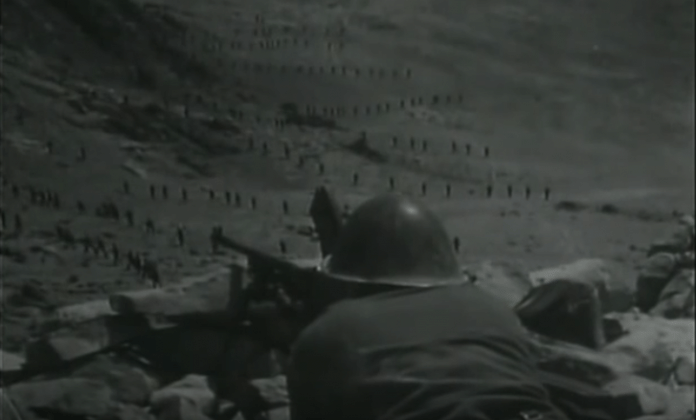Ahead of Vijay Diwas, ThePrint looks back at Chetan Anand’s classic ‘Haqeeqat’, which remains India’s best war film.
Chetan Anand’s film Haqeeqat on the 1962 Indo-China war is perhaps India’s best war film but it is also a significant cultural document about an event that had severe long-term impacts on the country.
The film focuses on a small group of Indian soldiers in Ladakh. Set against a real battlefront, and shot on location in Ladakh in black and white, the eldest of the famed Anand brothers approached the war with a sense of realism, unlike the lofty films in the war genre made subsequently.
Featuring a raft of wonderful actors including Balraj Sahni, Dharmendra, Vijay Anand, Sanjay Khan and Priya Rajvansh, the film Haqeeqat begins with tensions along the Indo-China border. After a series of events, Captain Bahadur Singh (Dharmendra) and Major Ranjit Singh (Balraj Sahni) find themselves in Ladakh.
The wait for the build up to the war is excruciating for the soldiers who reminisce about past romances and relationships. With tensions finally resulting in savage Chinese aggression, the soldiers find themselves at the mercy of orders from the top as diplomacy insists that Indians don’t attack first. As the soldiers get outnumbered by the enemy, the film shows a few skirmishes and then the battle, which resulted in heavy casualties with Indians finding it hard to retreat.
Anand ensured that he maintained the authenticity of the terrain, the battlefield, and the characters. He also focused on a host of characters, in an expansive storytelling style for the time that has since become the staple for all war films made in India. Actors turned in deeply felt performances, especially Sahni and Dharmendra. Sanjay Khan too left an impression in an affecting role. The film’s grand battle sequences remain unmatched in Indian cinema history.
The most memorable part of the film, however, was its music. Composer Madan Mohan and lyricist Kaifi Azmi delivered over half a dozen gems, including Hoke Majboor Mujhe and Kar Chale Hum Fida. The latter is possibly the most popular among ‘patriotic songs’ in India.
However, owing to the subject and the time it was made in, Anand could not rid the film of heavy melodrama. It is not a bad word in itself, but affects the grittiness the subject demands.
Patriotism became the centrepiece of a film that’s actually about a war most Indians would rather forget. Left-leaning Anand also thought it appropriate to tell the Jawaharlal Nehru government’s view of the war, probably a prudent decision given the time of its making. China was the villain in the film and that sentiment has remained in the larger national narrative since.
The Indo-China war resulted in heavy casualties on the Indian side, over a thousand at least, suggest estimates. Yet, in the years since, only one major Hindi film has been made on it – Tubelight (2017).
Most war films end up conveying the message of the futility of war. Accepting India’s heavy defeat in the war, Anand expressed that grief through Haqeeqat, a landmark film.







The Kennedy administration was disturbed by what they considered “blatant Chinese communist aggression against India”. In a May 1963 National Security Council meeting, contingency planning on the part of the United States in the event of another Chinese attack on India was discussed. Defense Secretary Robert McNamara and General Maxwell Taylor advised the president to use nuclear weapons should the Americans intervene in such a situation. McNamara stated “Before any substantial commitment to defend India against China is given, we should recognise that in order to carry out that commitment against any substantial Chinese attack, we would have to use nuclear weapons. Any large Chinese Communist attack on any part of that area would require the use of nuclear weapons by the U.S., and this is to be preferred over the introduction of large numbers of U.S. soldiers.”
Very brilliant piece of writing. True picture of our administrators but I am still hunching if any one officer retain at a particular position/sector then corruption or manipulation will reduce or will increase …
Best !
This is the biggest blunder Midi Govt. is going to commit . Now Career bureaucrats will be replaced with sycophants from media, NGO and political lallus. We are going to so Pakistan did to its bureaucracy. The result will be what happened to Pakistan from 1950 till now. The manipulative politicians and greedy and also so called liberal media personals along with corrupt NGOs are going to play the role in doing the damage to India which secreterian violence, terrorism and war could not do. Any one who loves his country will certainly oppose this. We all know what these sycophants from politics, NGOs and media are upto
.
Dear sir the film Haqeeqat was a very realistic humanity and a morality film with lots of emotional aspects very few celloid had been produced at that level universal my with regards apsinha